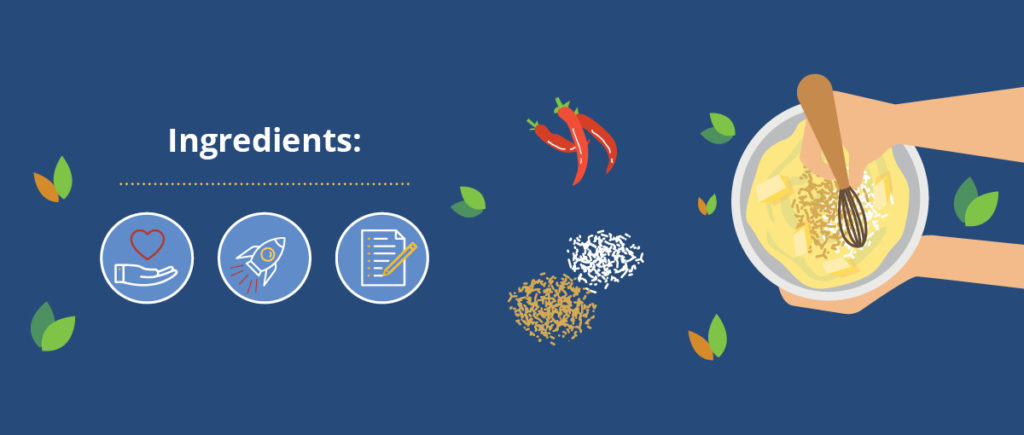35. Chris Wilton’s Recipe for Success

Is there a recipe for entrepreneurial success? Chris Wilton has established a successful and growing catering business, and the recipe he developed has some ingredients that every entrepreneur can utilize.
Key Takeaways and Actionable Insights
Economists (e.g. Murray Rothbard in Man Economy and State) often talk about the recipe that entrepreneurs develop for business growth and success. They don’t quite mean it literally — a fixed proportion of ingredients combined in the same way and the same sequence every time for the same result — but the analogy is nevertheless useful. Recipes are plans entrepreneurs utilize to advance from one step to the next in pursuing their goals.
A recipe is intellectual property — software if you will. Sometimes it’s opensource, sometimes it’s proprietary. When a chef utilizes a recipe, even one that is well known, both the chef and the customer anticipate something unique: Mary makes the best chocolate cake! Lots of people make chocolate cake, and they might use the same ingredients as Mary, but, in the subjective view of a customer, no one’s result is as good as Mary’s.
To get a result, Mary has to combine hardware with the software, and perhaps there is an edge there. We might call that the capital structure that is perfectly tuned to Mary’s purpose and matches her skills. Perhaps it’s even possible to assemble superior ingredients — a special and better kind of chocolate for example.
Mary might also need collaborators. She certainly needs customers to subjectively evaluate her cake.
We’ve probably tortured the analogy enough at this point. But hopefully, we got you thinking about the role of the entrepreneur in assembling resources in order to produce something that the customer values.
In this week’s podcast, Chris Wilton of Wilton’s Catering gave us his recipe for a successful and growing business. We’ve captured it in the accompanying PDF.
Here are some of the headlines:
Start with self-assessment: The one universal attribute of entrepreneurship that everyone seems to agree on is: it’s hard. It requires creativity but also discipline, determination and grit. It’s important to have examined your own disposition before you embark on the entrepreneur’s journey. Passion and drive are mandatory. (There’s a self-assessment tool, and a journey map.)
Identify a market and a customer: Chris Wilton knew his industry, and worked hard to pick the right beachhead customer. The beachhead customer is the first adopter who will be your customer-partner in getting your business off to a good start. Chris chose a nearby university with a highly developed and diverse set of catering needs, where he could develop his unique style of food and service.
Plan, plan, plan: Prior to launch, Chris spent months developing a detailed plan. Working from the customer (what are their needs — identified by multiple, frequent, in-depth customer conversations) backward through on-site service and set-up, delivery, capital equipment, real estate, raw material procurement, recipes, hiring and training and operating manuals. Chris’s time allocation and effort in planning was intensive. And it paid off.
Develop a customer experience, not just a service: Chris is totally focused on delivering a delightful customer experience, which entails a lot of empathic listening to the customer to understand what they expect, and then disciplined and detailed execution at every event and every meal, including the customer experience orientation and training of staff. After the event, always ask and listen for customer reactions. Was the experience good? How could it be better?
Innovate, innovate, innovate: You evaluate so that you can innovate. Innovation is continuous improvement — always looking for something new and better that will create new value for customers. A new or improved recipe, better preparation methods, improved staff training — it’s all innovation when it’s done to elevate the customer experience. One of Chris’s technique’s is sampling events where he can try new things, give away his food for free, and get feedback that he can use to perfect the innovation.
What’s the end-result? For Chris, it’s happiness. He loves and enjoys what he is doing, and he brings happiness to customers, to the attendees at customer events, and to his employees. That’s the great fulfillment of entrepreneurship.
DOWNLOAD
 Download Chris Wilton’s Recipe for Entrepreneurial Success PDF (141 KB)
Download Chris Wilton’s Recipe for Entrepreneurial Success PDF (141 KB)


Responses